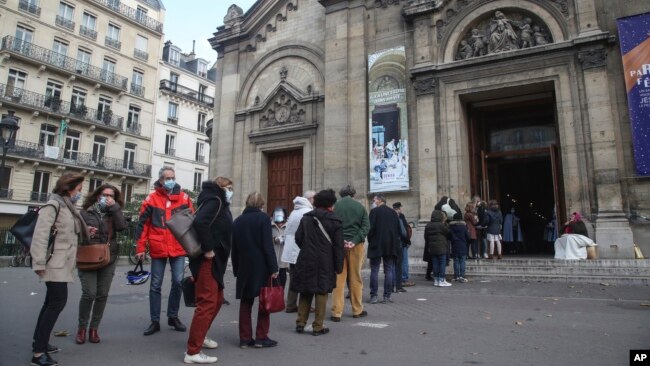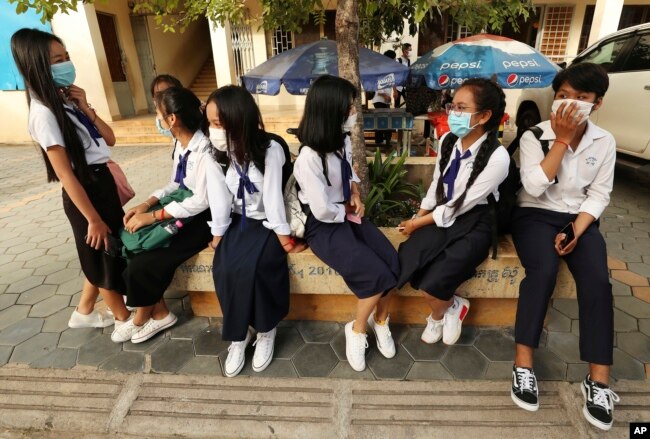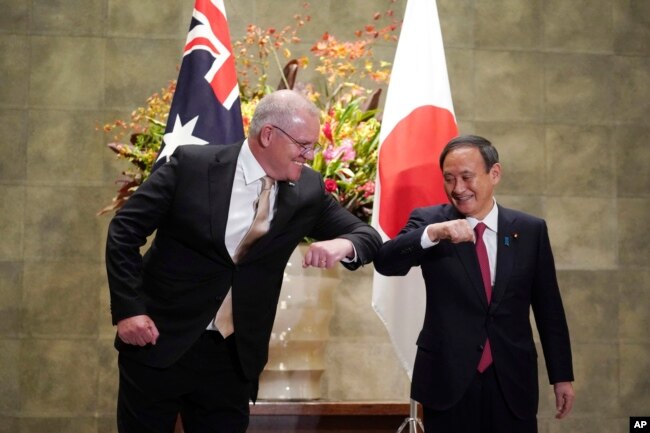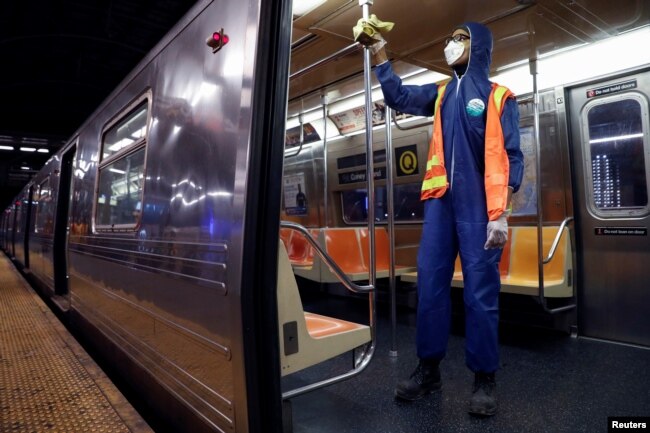コロナ後の世界
まだ抑え込めても、原因解明もされていない中、ワクチンニュースで世界はすでにアフターコロナの世界を見ています。
これからも続く未知のウイルスとの戦い!!!
今回のコロナではっきり分かったのが、一国の衛生への努力だけではパンデミックはこれからも救えないということです。
そして、日頃の衛生への関心が高く、その環境も整っている日本ですが、世界を見渡せば日々の暮らしに追われ、衛生とは無関係な地域や、経済では大きくても一向に公衆衛生教育が進まない国もあるということです。
”教育” ”啓蒙” ”協調” 切なる願い、世界へ届け!!!
今日のVOAニュース、早速始めましょう (^^♪ 😢
- COVID-19が去った後、私たちの生活はどう変わるのか?
- silver linings 「銀の裏地」「銀の縁取り」「輝く縁」
- How Will Our Lives Change After COVID-19 Is Gone?
COVID-19が去った後、私たちの生活はどう変わるのか?
How Will Our Lives Change After COVID-19 Is Gone?
December 07, 2020
COVID-19のパンデミックは、私たちの日常生活習慣の多くを変えました - 友人に挨拶をする方法から、働き方まで。
これらの変化は、新しいコロナウイルスの広がりを制限するために発展してきました。そして、疑問を投げかけています:パンデミックが終わった後、どのような習慣や習慣が残るのだろう?かと。
コロンビア大学のバルン・マテマ氏には確信がありません。マテマ氏は医師で疫学の助教授で、病気の蔓延と制御の研究をしています。彼は VOA ニュースに、人々 は色々な習慣を継続するかもしれない。あるいはおそらく、”パンデミック自体の記憶が薄れれば、これらの習慣 も薄れていくのではないか”と語っています。
フェイスマスクの着用
今回のパンデミック以前から、多くの国では人前で顔を覆うことが当たり前でした。例えば、東アジアでは2003年にウイルス性呼吸器疾患のSARSが流行したことで、マスク着用が一般的になりました。
しかし、アメリカではマスク着用の習慣はありません。一年前であれば、公共の場でマスクをしている人を見たら、病気か変だと思われたかもしれません。
しかし今日では、COVID-19の感染拡大を防ぐためにマスクを着用することは、多くのアメリカ人にとって新しい常識となっています。11月20日現在、37の州、コロンビア特別区とプエルトリコでは、公共の場でのマスク着用を義務づけています。
しかし、これはパンデミックが終わった後も残る習慣なのでしょうか?
ボリス・ルシュニアック 氏は、メリーランド大学の公衆衛生学部を率いています。アメリカ人はほとんどの場合、この冬、一般的な風邪やインフルエンザから保護するためにおそらくはマスクを着用するだろうと、彼は言います。
しかし、彼はマスク着用が新しい全世界的なな習慣になるとは思ってません。パンデミックの最中、マスクを着用してもらうのが難しい人もいると指摘しています。
個人的な挨拶
ルシュニアック氏によると、他人の手を握る習慣は、今後数年で一般的ではなくなりそうだと言います。人々が手を振ったり、他の挨拶をすることを選ぶだろうと予測しています。
全体的に、アメリカ人は他の人に触れるのを嫌うだろうと、アーロン グラット氏、アメリカの感染症協会の広報担当者は言います。友達や同僚との触れ合いが減ると予測しています。
清潔度
もう一つの永続的な効果は、より高いレベルの清潔さへの期待かもしれません。
コロンビア大学の マテマ氏はVOA にこう語っています ”パンデミックのような事を通過するということは、政治的にどのように感じるかに関係なく” 恐ろしい出来事だと。
彼は、頻繁に手を洗ったり、表面をきれいにするようないくつかの衛生習慣が残る可能性は高いとしています。そしてこれはパンデミックのsilver linings (希望の光)の1つであるかもしれません -- 悪い状態からのよい結果。
もう一つのsilver liningは、人々がいくつかの病気の広がりについてより多くを知っているということである、とアーロン・グラット氏は言います。彼らはまた、"不潔さや劣悪な衛生状態 "をおそらく受け入れないでしょう。
公共サービスの変化
ビジネスの中にも変化を余儀なくされているものがあります。これは特に、航空会社、レストラン、店舗などのサービス業に当てはまります。
例えば、多くの企業では、パンデミックの間は接触を少なくしています。商品や食事を購入する際にサインする紙の領収書も少なくなっています。航空会社は、飛行機の表面や機内の空気を消毒するための新しいルールを設けています。
メリーランド大学教授のルシュニアック氏はVOAに対し、パンデミック後の世界でより重要なのはビシネスの変化だろうと語っています。
「清潔さが重要であること、消毒が重要であることを学びました。そして、職場でもそれを継続していくことになるでしょう。」と彼は話しています。
病気の時の自宅待機
パンデミックのもう一つの長期的な影響として、病気の時には自宅で仕事をしたり、家にいる人が増える可能性があります。
ルシュニアック氏は、パンデミックの影響でオンラインで仕事をする機会が増えたと言います。体調が悪いときは、自宅で仕事をすることができます。パンデミック後の世界では、自宅で仕事をすることは、病気の蔓延を食い止めるために重要な役割を果たすかもしれない、と彼は言っています。
silver linings 「銀の裏地」「銀の縁取り」「輝く縁」
"Every cloud has a silver lining."
どんな困難な状況(cloud)にも希望(silver lining)はある。
SILVER LINING | 意味, Cambridge 英語辞書での定義
困難な状況や不愉快な状況から得られる利点。
-物事が黒く見える時には、常に銀の光がある。
 Photo by Kyllr Hoston
Photo by Kyllr Hoston
silver liningという言葉の起源はイギリスの作家John Miltonの仮面劇『Comus』(1634)だそうです。後の時代になって、同じくイギリスのCharles Dickensが小説『Bleak House』(1853)の中でこのMiltonの言葉に言及しているそうです。
出典:『Wise Words and Wives' Tales: The Origins, Meanings, and Time-Honored Wisdom of Proverbs and Folk Sayings, Olde and New』(New York: Avon Books, 1993)written by Stuart Flexner and Doris Flexner
この表現はここにあるように、海外ドラマでもsilver liningで使われています。意味は、そう! ”希望の兆し”。
How Will Our Lives Change After COVID-19 Is Gone?
 Church-goers wearing face masks as a precaution against the coronavirus lineup outside the Notre-Dame-des-Champs church in Paris, Sunday, Nov. 29, 2020.
Church-goers wearing face masks as a precaution against the coronavirus lineup outside the Notre-Dame-des-Champs church in Paris, Sunday, Nov. 29, 2020.
The COVID-19 pandemic has changed many of our daily habits – from how we greet our friends to how we work.
These changes have developed to limit the spread of the new coronavirus. And it raises a question: What habits or customs will remain after the pandemic ends?
Barun Mathema of Columbia University is unsure. Mathema is a doctor and an assistant professor of epidemiology, the study of the spread and control of diseases. He told VOA News that people may keep some of the habits. Or perhaps, he added, “as the memory of the pandemic itself fades, so will these habits.”
 Students wearing face-masks, wait for their morning school class at Santhormok high school, in Phnom Penh, Cambodia, Monday, Nov. 2, 2020. (AP Photo/Heng Sinith)
Students wearing face-masks, wait for their morning school class at Santhormok high school, in Phnom Penh, Cambodia, Monday, Nov. 2, 2020. (AP Photo/Heng Sinith)
Wearing face masks
Even before the current pandemic, it was normal in many countries for people to wear a face covering in public. For example, face masks became more common in East Asia in 2003 with the rise of SARS, a viral respiratory disease.
However, there is no tradition of mask-wearing in the United States. A year ago, if you saw someone here wearing a mask in public, you might think they were sick or even strange.
Today, however, wearing a mask to prevent the spread of COVID-19 is the new normal for many Americans. As of November 20, 37 states, the District of Columbia and Puerto Rico require people to wear face coverings in public.
But is this a habit that will remain after the pandemic is over?
Boris Lushniak leads the School of Public Health at the University of Maryland. He says Americans will most likely wear masks this winter to protect against the common cold and influenza.
However, he does not think mask-wearing will become a new nationwide habit. He noted that it has been difficult to get some people to wear them in the middle of a pandemic.
 FILE - Australian Prime Minister Scott Morrison, left, and Japanese Prime Minister Yoshihide Suga bump elbows to greet prior to the official welcome ceremony at Suga's official residence in Tokyo Tuesday, Nov. 17, 2020.
FILE - Australian Prime Minister Scott Morrison, left, and Japanese Prime Minister Yoshihide Suga bump elbows to greet prior to the official welcome ceremony at Suga's official residence in Tokyo Tuesday, Nov. 17, 2020.
Personal greetings
Lushniak says the custom of shaking another person’s hand is likely to become less common in the years to come. He predicts that people will chose to wave or use some other greeting.
Overall, Americans might be less willing to touch others, says Aaron Glatt, a spokesperson for the Infectious Diseases Society of America. He predicts that the ease of touching friends and co-workers will happen less often.
Cleanliness
Another lasting effect could be an expectation of higher levels of cleanliness.
Mathema, of Columbia University, told VOA that “going through something like a pandemic, regardless of how you feel politically,” is a frightening event.
He added that some hygiene habits, like frequent hand washing and cleaning surfaces, are likely to stay. And that could be one of the pandemic’s silver linings -- a good result from a bad situation.
Another silver lining, added Aaron Glatt, is that people know more about the spread of some diseases. They also may not accept “uncleanliness or poor hygiene.”
 FILE - A worker wipes down surfaces as the MTA Subway closed overnight for cleaning and disinfecting during the outbreak of the coronavirus disease (COVID-19) in the Brooklyn borough of New York City, May 7, 2020.
FILE - A worker wipes down surfaces as the MTA Subway closed overnight for cleaning and disinfecting during the outbreak of the coronavirus disease (COVID-19) in the Brooklyn borough of New York City, May 7, 2020.
Changes in public services
Some businesses have had to make changes too. This is especially true of service industries such as airlines, restaurants, and stores.
For example, many companies use less contact during the pandemic. There are fewer paper receipts to sign when purchasing products or meals. Airline companies have new rules for disinfecting surfaces and the air inside the airplanes.
Lushniak, the University of Maryland professor, told VOA that the more important part of the post-pandemic world will be changes to businesses.
“We learned that cleanliness is important, that disinfection is important,” he said, “and we will continue doing that in the workplace.”
Staying home when sick
Another long-term effect of the pandemic could be more people working from home and staying at home when sick.
Lushniak added that the pandemic has created more opportunities for working online. If people are not feeling well, they can simply work from home. In a post-pandemic world, he said, working from home might be an important part of stopping the spread of disease.
_______________________________________________________________
Words in This Story
pandemic medical noun an occurrence in which a disease spreads very quickly and affects a large number of people over a wide area or throughout the world
habit – n. a usual way of behaving : something that a person does often in a regular and repeated way
fade – v. to lose strength or freshness : to become weaker
respiratory – medical : the act or process of breathing
hygiene – n. the things that you do to keep yourself and your surroundings clean in order to maintain good health
receipt – n. a piece of paper on which the things that you buy or the services that you pay for are listed with the total amount paid and the prices for each
opportunity – n. n amount of time or a situation in which something can be done